Thailand launches manhunt for policemen after torture video
Two police officers are being sought in connection with the torture death of a suspected drug dealer in early August.

Thai authorities have launched a manhunt for two police officers suspected of being involved in torturing to death a man who had been arrested for drug offences, police say, after a video of the incident was shared widely online.
The video, posted by lawyer Sittra Biabungkerd on his Facebook page, showed what appeared to be a man being suffocated by a plastic bag placed over his head while he was pinned down by four men.
Keep reading
list of 3 itemsIn Thailand, Google takes down two maps identifying royal critics
Thailand protests: How much is the king worth?
Five police officers from Nakhon Sawan province have been detained, while a “round-the-clock” hunt was on for two others, deputy police spokesman Kissana Phathanacharoen said in a statement on Thursday.
Arrest warrants issued for the suspects include the charge of murder by torture.
Sittra, who runs a legal aid foundation, said he received the video clip from a lower-ranking officer who asked him to pass it to the national police chief, claiming it showed “Superintendent Joe” of Nakhon Sawan police station trying to extort money from a drug dealer.
An official police order identified “Superintendent Joe” as Police Colonel Thitisan Uttanapol. Police raided his home on an upmarket residential estate in Bangkok on Wednesday and found 13 cars, according to media who accompanied police on the raid.
Thai Police Chief Suwat Jangyodsuk had on Wednesday urged Thitisan to surrender to authorities.
“There are still good cops, bad people that do bad things will face consequences,” he said, adding that Prime Minister Prayuth Chan-ocha had personally instructed police to make improvements in order to restore public confidence in the force.
“This case of police torture and murder is shocking. But this is not the first case and it is unlikely to be the last case until and unless the police conduct serious interrogations and investigations and leave no stones unturned,” said Sunai Phasuk, a senior researcher for Human Rights Watch.
Small-scale corruption, such as soliciting bribes from motorists, is not rare among poorly paid police officers, analysts said. Some also have a reputation for beating suspects to elicit confessions.
But cases occasionally emerge of corruption at a higher level.
The “Blue Diamond Affair” case, involving the 1989 theft of jewellery by a Thai overseas worker from the palace of a Saudi prince, cast a harsh spotlight on the police force after much of the loot went unrecovered and a police general was convicted of kidnapping and killing relatives of a witness in the case.
Human Rights Watch’s Sunai charged that Thai police often act with total impunity, protecting each other.
“This is no longer an individual issue. It’s a corrupt system that allows abusive acts,” he said.
“The case will be a real test for the Thai justice system that has faced questions by some about its ability to hold officials like the police accountable,” said Thitipol Phakdeewanich, the dean of Ubon Ratchathani University’s political science faculty.